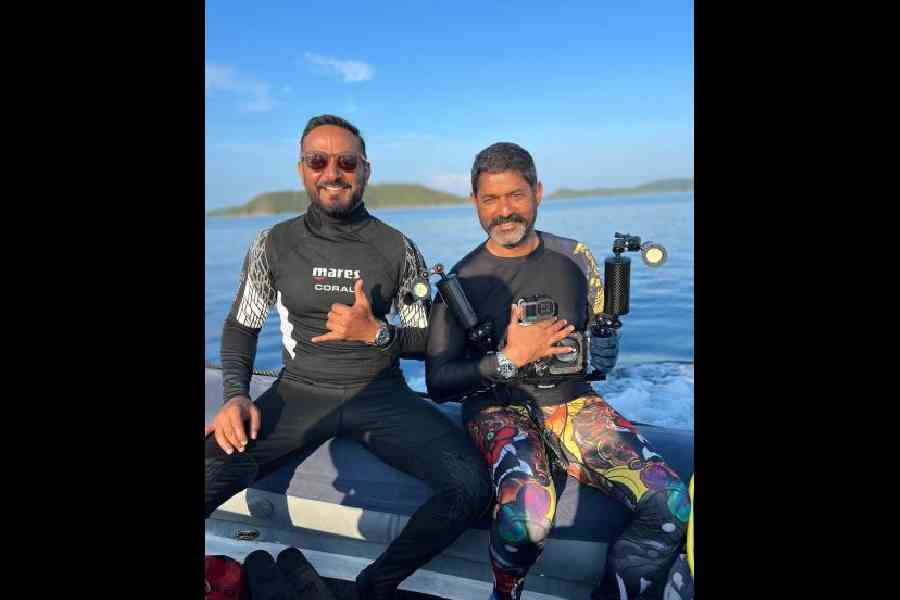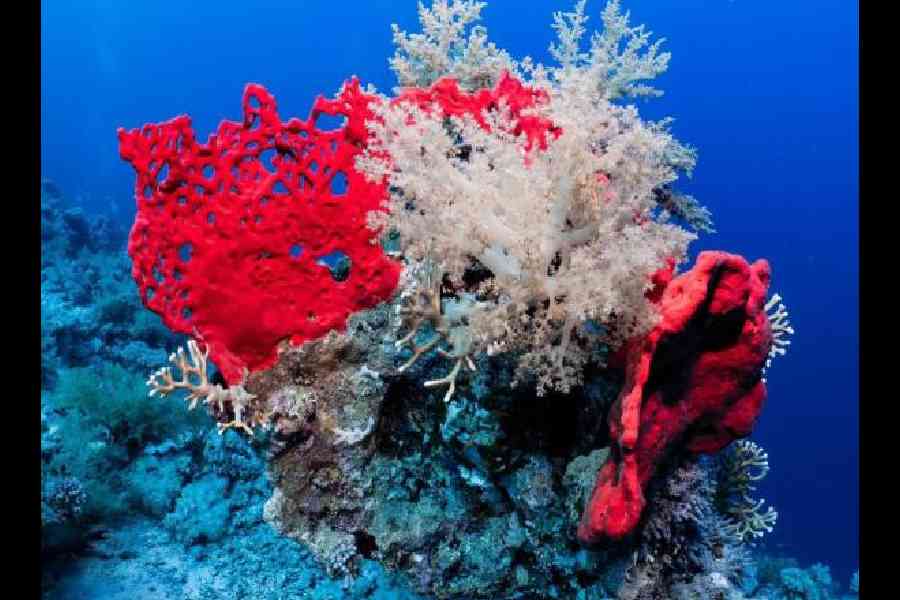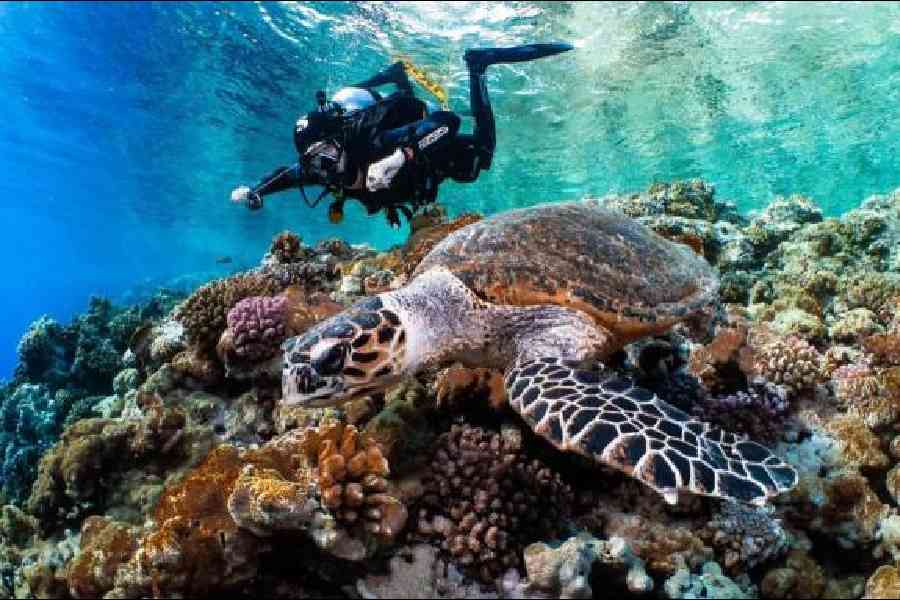India’s coastline is 7,516.6km long, including the Andaman and Nicobar Islands and Lakshadweep. Our enormous coastline touches nine states and four union territories.
India’s population, give or take a few million, hovers around the 1.4 billion mark. According to a best guesstimate by the Indian government, around 0.5 per cent or just 7 million of us know how to swim. Back-of-the-napkin math will tell you that if you’re in a crowd of 200, then maybe one person will know how to swim — but not well enough to attempt a Baywatch-style rescue, if things go wrong.
How do I know all of this? Google gave me the stats, but dive shop owners and scuba diving guides around the world gave me the low-down, that is, Indians generally struggle in the water as swimmers and don’t usually make great scuba divers.
My brother Nitish and I (and a few thousand others) have been setting the record straight on that one — with our scuba diving company Fleetfoot Adventures, which we set up in Bangalore in 2015.
We grew up in middle-class India and back in the 1990s, middle-class India was opening its eyes and minds to MTV, Sachin Tendulkar and movies made by the Khans. What middle-class India didn’t do much of at the time was travel extensively around the world or scuba dive with mantas and sharks.
Middle-class upbringing
Diving began in the early 2000s for us. Initially, as a way for the two of us — who lived in different cities — to catch up, travel and spend time together. Nitish and I were both certified scuba divers and we wandered and dived around the Thai region briefly before we discovered that some of the best diving in the world was in our backyard — in the waters around the Lakshadweep Islands and a little further south — the Maldives, which is only a two-hour flight from Bangalore.

Nikhil Chinapa and Nitish Chengappa
Over the years we’ve also dived in the Red Sea (which has some of the most stunning corals on the planet), in Rajah Ampat and the Banda Sea in Indonesia, Palau in Micronesia and Sipadan in Malaysia. Somewhere along the way of diving here, there and everywhere, making silly faces at clownfish and sharks underwater and introducing dozens of our friends and their kids to diving — Nitish decided to quit his corporate day job and make diving his life. Fleetfoot Adventures was born and my first reaction was: “Dude… you can’t quit your day job for this, man!”
Man, was I wrong! As wrong as a bookie betting against India in the T20 World Cup! But my being wrong was a reflection on how much India had changed from the ’90s middle-class society my brother and I had grown up in.
This new millennial middle-class India had unleashed its papad, selfie stick and namkeen carrying hordes onto the global tourism world. They travelled the world for adventures their parents never had — or never had the opportunity to experience. They climbed mountains, plunged into uncharted waters for sport and crossed continents to attend music festivals and fall in love — sometimes just for the weekend.
Back in the day, our parents wouldn’t let us cross our bedtime deadline to watch Chitrahaar on Doordarshan — but times, as Bob Dylan had croaked in that distinctive warble of his, all those years ago — they were a-changin’.
Oh fish!
Change was, however, a slow process. Most people are still needlessly fearful of sharks and the truth is, they don’t need to be. Reef sharks aren’t the least bit interested in people, when they have the finest selection of their main food — reef fish and octopuses in abundant supply. Sharks also don’t take chances with creatures bigger than themselves and have always, to my experience, shied away from any human contact.
Over the years, I’ve dived in close proximity with hundreds of sharks including black and white-tip reef sharks, grey reefs, nurse sharks, tiger sharks, bull sharks, hammerheads, silky sharks, oceanic white tips, zebra sharks, wobbegong and guitar sharks.

Being weightless and drifting along on a light current with beautiful coral and reef fish darting about you, is a truly spiritual experience
Sharks are just one of the things amongst thousands of species you encounter underwater. Soft and hard corals, with the billions of reef fish that live amongst them, resplendent in every imaginable colour become almost commonplace for scuba divers. Clownfish hiding shyly in anemone tentacles, fusiliers that dart about in enormous schools close to the surface, unicorn fish that play around in the bubbles over your head and then occasionally brush past trailing ponytails of women divers, giving them a bit of a start! Schools of banner fish, clouds of anthias and hovering packs of marauding barracudas — the list of life underwater goes on and on.
Turtles are amongst my favourite underwater creatures, along with the enormous flying manta rays. I love encountering beautiful clown triggerfish, oriental sweetlips and the rare school of dolphins who are generally super shy of human contact. You can often hear their whistles and squeaks underwater but just like your local politician, you rarely spot them in real life.
Diving has definitely been an enriching experience in terms of what I’ve seen and the people I’ve met along the way, some of whom have become lifelong friends. And it has imparted some precious life lessons along the way.
Diving is a completely judgement-free activity. I’ve seen strangers of all shapes, sizes, backgrounds and colours hang out on a dive boat, sharing stories about their lives and their diving experiences from around the world. That’s one of the reasons why there are so many solo divers in our community and also why Fleetfoot Adventures has a significant number of solo women divers who travel with us. It’s generally considered a “safe” space and has a respectful, environmentally aware community.
At this point in time, I have to confess that diving is an addictive activity. Yup, it’s true. Once you’ve experienced the incredible lightness of being while breathing lungfuls of air underwater, you’ll never want to give it up. Being weightless and drifting along on a light current with beautiful coral and reef fish darting about you, is a truly spiritual experience. As is coming face-to-face with a curious batfish or meeting the intelligent gaze of a passing manta, flying inches over your head. Once you’ve seen the things I’ve seen, I guarantee you your life will never be the same again.
The next time you have a four-day break, step out of your homes, and into our world where I promise, you’ll not only conquer the depths of the oceans but also realise the depths of your own potential.
Four days is all it takes to get your Open Water Certification as a scuba diver. I’ll leave you with this quote I found on the Internet: We dive not to escape life, but for life not to escape us.
Nikhil Chinapa is a music entrepreneur, TV host and co-founder Fleetfoot Adventures(@fleetfootadventures on Instagram)
Scuba diving FAQs
Will I get bitten by sharks?
No! Reef sharks are quite shy and stay away from divers. You’re not on their menu anyway because they love fish and there’s an enormous buffet of those on the reef.
Do I need to know how to swim in order to scuba dive?
Having basic swimming skills and feeling comfortable in the water is required to ensure your safety and enjoyment.
How old do I need tobe to scuba dive?
You can do a “Bubble Maker” course at eight years and a Junior Openwater Diver certification at 10 years. There is no upper age limit.
Do I need to be physically super-fit to dive?
You’re weightless underwater so your physical size is usually not a factor at all. That said, a moderate level of fitness is advised to dive. If you have any chronic heart/lung issues, you will need a certification from a dive-accredited doctor, to scuba dive.
How many days isthe scuba diving course?
Open Water Diver certification (I recommend this) requires four training dives and a few theory course modules, which usually take three-four days to complete. You can also do a single “Discover Scuba Dive” which counts towards the four dives you need for the OW course.
Can I scuba dive if I wear glasses or contact lenses?
The answer is, definitely yes! You have two options for your vision: Prescription scuba masks or Soft, disposable contact lenses. But before you commit to any vision-correcting mechanism, here’s something to consider. Water magnifies your vision. Because of refraction, objects appear one-third larger and closer underwater. This means that if you are slightly nearsighted or only have very minor vision impairment, you may not need to wear contacts or a prescription scuba mask to dive (aia PADI blog).
What do I need to pack for a diving adventure?
A few changes of quick-drying swimwear, reef-friendly sunscreen and a positive attitude. I would also recommend flip-flops, sunglasses and a refillable bottle.











